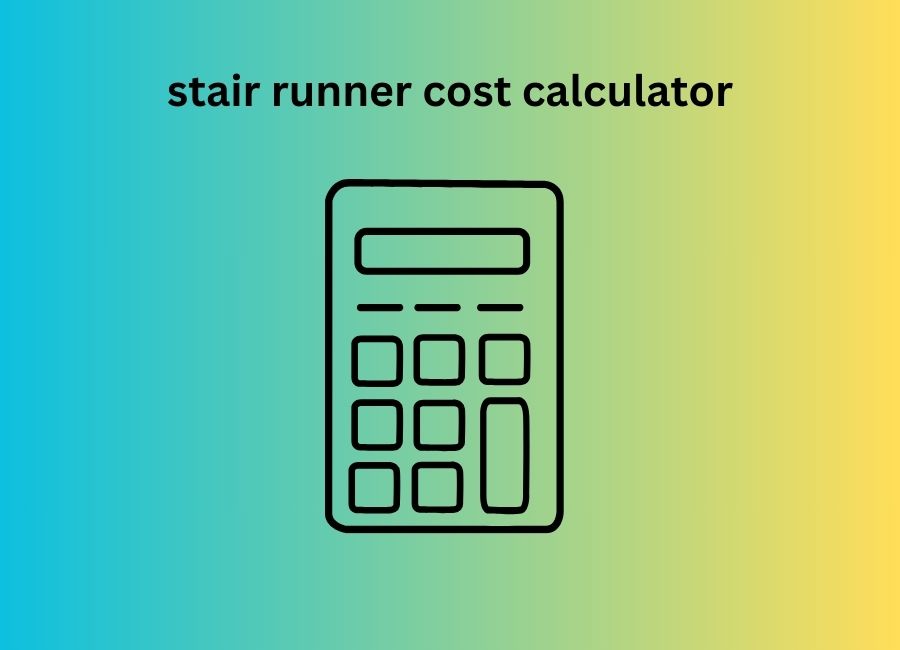Stair Runner Cost Calculator
A stair runner is a beautiful and practical addition to any staircase, providing both aesthetic appeal and functional benefits. It helps reduce wear and tear on the stairs, enhances safety by providing extra traction, and adds warmth and color to the space. However, understanding how much it will cost to install a stair runner is essential before starting your project. This is where a Stair Runner Cost Calculator can help.
In this article, we will walk through how a Stair Runner Cost Calculator works, the factors that influence the cost of installing a stair runner, and how to use the tool effectively to estimate the overall cost of your project.
What is a Stair Runner Cost Calculator?
A Stair Runner Cost Calculator is an online tool designed to help you estimate the total cost of installing a stair runner based on the size, material, style, and other specifics of your staircase and runner preferences. The calculator helps you consider factors like the length and width of the stairs, the type of carpet or fabric used for the runner, and the complexity of the installation.
By using a Stair Runner Cost Calculator, homeowners, interior designers, and contractors can get a quick, accurate idea of how much their stair runner project will cost before starting the work.
Why Should You Use a Stair Runner Cost Calculator?
Using a Stair Runner Cost Calculator provides several key advantages:
- Accurate Budgeting: It gives you a reliable cost estimate, allowing you to allocate the proper budget for your stair runner project.
- Cost Breakdown: Many calculators provide a breakdown of the total cost by material, labor, and installation, helping you understand exactly where your money is going.
- Ease of Comparison: You can input different materials or styles and compare the estimated costs, helping you choose the option that fits your budget and design preferences.
- Time Efficiency: Instead of contacting several suppliers for quotes, the calculator allows you to get an instant estimate without having to wait for a professional.
Factors That Affect the Cost of Installing a Stair Runner
Several factors influence the overall cost of installing a stair runner, and understanding these variables will help you use the Stair Runner Cost Calculator more effectively.
1. Staircase Dimensions
The size of your staircase is one of the primary factors influencing the cost of a stair runner. Key dimensions to consider include:
- Number of Steps: More steps require more material, which increases the cost of the runner.
- Stair Width: Wider stairs require more fabric or material for coverage. Stair runners typically come in standard widths, but custom sizes may cost more.
- Length of the Staircase: The longer the staircase, the more fabric or material will be required to cover the entire area.
Most Stair Runner Cost Calculators will ask for the total number of steps or the overall length of your staircase to help calculate the required material.
2. Material Choice
The type of material used for your stair runner significantly impacts the cost. Common materials for stair runners include:
- Carpet: Standard carpet runners are typically made from synthetic fibers, wool, or a blend of both. Wool tends to be more expensive than synthetic fibers but offers a luxurious, durable finish.
- Jute or Sisal: Natural fiber runners are gaining popularity for their eco-friendly and rustic look. They tend to be more durable and less expensive than some carpets.
- Velvet or Silk: For a high-end, luxury finish, velvet or silk runners are available. However, these materials come with a higher price tag due to their softness, appearance, and maintenance needs.
- Woven or Braided Rugs: These may come in different fabrics, including cotton or wool, and can vary widely in price depending on the weave and material.
The Stair Runner Cost Calculator will often allow you to select the material you’re interested in to generate a more accurate cost estimate.
3. Pattern and Design
The complexity of the runner’s design can influence the price. Custom patterns, colors, or designs will cost more than plain, solid-color runners. Here are some design elements to consider:
- Solid Colors: Basic, single-color runners tend to be less expensive.
- Patterns: Runners with intricate patterns, such as stripes, geometric shapes, or floral designs, may require more time and effort to manufacture, increasing their cost.
- Custom Designs: If you’re opting for a custom design, expect a higher price, as these runners are made to order and often involve more intricate patterns or personalized elements.
If you’re interested in a specific pattern, the calculator may ask for the style or pattern to give a more tailored estimate.
4. Padding and Underlay
Adding padding or underlay beneath the stair runner not only enhances comfort and noise reduction but also increases the overall cost. The quality of the padding material will also affect the price, with higher-density foam or more durable padding being more expensive.
- Basic Padding: This is usually made from foam or felt and is often included in the basic installation cost.
- High-Density Padding: More premium padding options offer additional durability and comfort and can be factored into the overall cost of the project.
Many calculators will provide an option to include or exclude padding, depending on your preference.
5. Installation Complexity
The complexity of installation can affect the labor cost of the project. For example, if your stairs have a curved or winding shape, installation may take longer, requiring more effort and precision. This will increase labor costs compared to a simple, straight staircase. Factors influencing installation complexity include:
- Straight vs. Curved Stairs: Curved stairs or stairs with landing areas will increase the installation difficulty and cost.
- Stair Design: Staircases with intricate details, such as handrails, newel posts, or irregular shapes, may require more time and effort to install the runner.
Some calculators will ask whether your stairs are straight or curved to estimate the labor cost more accurately.
6. Labor Costs
The cost of professional installation can vary based on your location, the complexity of the job, and the rates of local installers. Labor rates generally range from $1 to $5 per square foot depending on the region and the complexity of the installation.
If you’re using a Stair Runner Cost Calculator, the tool may ask for the square footage of the stairs to estimate labor costs accurately. Some tools may include an option for DIY installation, which could reduce costs if you’re able to handle the project on your own.
How to Use a Stair Runner Cost Calculator
Using a Stair Runner Cost Calculator is easy and involves just a few simple steps:
Step 1: Input Staircase Dimensions
Enter the number of steps and the width of the stairs to determine the area that needs to be covered.
Step 2: Select the Material
Choose the material you want for your stair runner. You can select from options like wool, jute, sisal, or synthetic fibers, each with a different cost range.
Step 3: Choose the Design
If applicable, specify whether you want a plain color or a patterned design. If you want a custom design, some calculators allow you to enter specific details.
Step 4: Add Padding/Underlay
Select the type of padding or underlay you want to include for added comfort and durability.
Step 5: Installation Complexity
Specify whether your stairs are straight or curved, as this will affect labor costs. If your stairs are especially complex, such as spiral or multi-level stairs, you may want to indicate this.
Step 6: Enter Labor and Additional Costs
Some calculators will allow you to input labor rates or may give an estimate based on location and complexity. Additional costs, like removal of old runners, may also be added.
Step 7: Calculate and Review
Once you’ve input all the necessary information, the calculator will generate an estimate of the total cost for your stair runner project. This will usually include a breakdown of material costs, padding, installation, and labor.
Example of Stair Runner Cost Calculation
Here’s an example of how the calculator works:
- Staircase Dimensions: 12 steps, 3 feet wide
- Material: Wool Carpet
- Design: Simple solid color
- Padding: High-density foam
- Stair Type: Straight stairs
- Labor Cost: $3 per square foot
After inputting these details, the calculator estimates the following:
- Material Cost: $600 (for the wool carpet)
- Padding Cost: $100
- Labor Cost: $300 (for installation)
- Total Estimated Cost: $1,000
Conclusion
A Stair Runner Cost Calculator is a useful tool that helps homeowners and contractors estimate the cost of installing a stair runner. By considering factors like the size of your stairs, the type of material, design complexity, and installation challenges, you can get a clear understanding of the potential costs involved in your project.
Whether you’re upgrading your staircase for style, comfort, or safety, using the calculator ensures that you stay within budget and make informed decisions. Be sure to compare prices, consider your options, and choose the best stair runner that suits both your aesthetic preferences and your budget.

